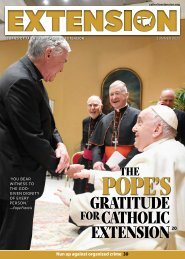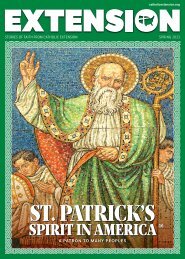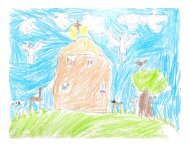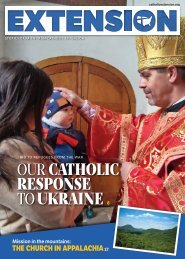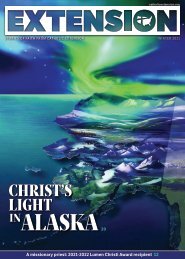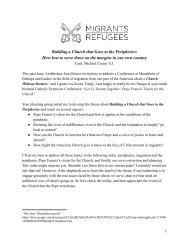Extension magazine - Spring 2024
What will be the impact of artificial intelligence on our world? Our article on page 24 considers how AI can assist as a helpful tool for the betterment of humanity, as well as its potential drawbacks. You will see images generated by a new AI system, Midjourney, that we prompted to create the cover of this magazine as well as vivid religious art. Also included is Pope Francis' 2024 address: "Artificial Intelligence and Peace."
What will be the impact of artificial intelligence on our world? Our article on page 24 considers how AI can assist as a helpful tool for the betterment of humanity, as well as its potential drawbacks. You will see images generated by a new AI system, Midjourney, that we prompted to create the cover of this magazine as well as vivid religious art. Also included is Pope Francis' 2024 address: "Artificial Intelligence and Peace."
You also want an ePaper? Increase the reach of your titles
YUMPU automatically turns print PDFs into web optimized ePapers that Google loves.
28 INSPIRE<br />
Cover Story<br />
<strong>Extension</strong> | <strong>Spring</strong> <strong>2024</strong> 29<br />
Artificial intelligence helped us<br />
visualize what conversations<br />
between holy friends St. Francis<br />
and St. Clare of Assisi might have<br />
looked like.<br />
Father Francis Clement Kelley<br />
established Catholic <strong>Extension</strong><br />
Society in 1905 to bring the<br />
sacraments to remote faith<br />
communities across the country. The<br />
mission first spread by way of the<br />
railways, with priests riding into tiny<br />
frontier towns to celebrate Mass from<br />
the backs of rail cars.<br />
Inspired by our early history, we<br />
prompted artificial intelligence to<br />
create an image showing Catholic<br />
<strong>Extension</strong> Society’s chapel car<br />
pulling into a small Montana<br />
town for Mass to be celebrated with<br />
the people. We gave AI the original<br />
image of our chapel car, seen above,<br />
so it could compute what the rail car<br />
looked like, and how people in the<br />
early 1900s should be presented.<br />
At the beginning of the<br />
New Year, a time of<br />
grace which the Lord<br />
gives to each one of<br />
us, I would like to address<br />
God’s People,<br />
the various nations, heads of state<br />
and government, the leaders of the<br />
different religions and civil society,<br />
and all the men and women<br />
of our time, in order to offer<br />
my fervent good wishes for<br />
peace.<br />
MESSAGE FROM<br />
HIS HOLINESS<br />
POPE FRANCIS:<br />
ARTIFICIAL<br />
INTELLIGENCE<br />
AND PEACE<br />
1. THE PROGRESS OF SCIENCE<br />
AND TECHNOLOGY AS A PATH<br />
TO PEACE<br />
Sacred Scripture attests<br />
that God bestowed his Spirit<br />
upon human beings so that<br />
they might have “skill and<br />
understanding and knowledge<br />
in every craft” (Ex<br />
35:31). Human intelligence is<br />
an expression of the dignity<br />
with which we have been endowed<br />
by the Creator, who<br />
made us in his own image and likeness<br />
(cf. Gen 1:26), and enabled us<br />
to respond consciously and freely to<br />
his love. In a particular way, science<br />
and technology manifest this fundamentally<br />
relational quality of human<br />
intelligence; they are brilliant<br />
products of its creative potential.<br />
In its Pastoral Constitution Gaudium<br />
et Spes, the Second Vatican<br />
Council restated this truth, declaring<br />
that “through its labours and its<br />
native endowments, humanity has<br />
ceaselessly sought to better its life.”<br />
[1] When human beings, “with the<br />
aid of technology,” endeavour to<br />
make “the earth a dwelling worthy<br />
of the whole human family,” [2]<br />
they carry out God’s plan and cooperate<br />
with his will to perfect creation<br />
and bring about peace among<br />
peoples. Progress in science and<br />
technology, insofar as it contributes<br />
to greater order in human society<br />
and greater fraternal communion<br />
and freedom, thus leads to the betterment<br />
of humanity and the transformation<br />
of the world.<br />
We rightly rejoice and give<br />
thanks for the impressive achievements<br />
of science and technology, as<br />
a result of which countless ills that<br />
formerly plagued human life and<br />
caused great suffering have been<br />
remedied. At the same time, techno-scientific<br />
advances, by making<br />
it possible to exercise hitherto unprecedented<br />
control over reality, are<br />
placing in human hands a vast array<br />
of options, including some that<br />
may pose a risk to our survival and<br />
endanger our common home. [3]<br />
The remarkable advances in new<br />
information technologies, particularly<br />
in the digital sphere, thus offer<br />
exciting opportunities and grave<br />
risks, with serious implications<br />
for the pursuit of justice and harmony<br />
among peoples. Any number<br />
of urgent questions need to<br />
be asked. What will be the consequences,<br />
in the medium and<br />
long term, of these new digital<br />
technologies? And what impact<br />
will they have on individual<br />
lives and on societies, on international<br />
stability and peace?<br />
2. THE FUTURE OF ARTIFICIAL<br />
INTELLIGENCE: BETWEEN<br />
PROMISE AND RISK<br />
Progress in information<br />
technology and the development<br />
of digital technologies in<br />
recent decades have already begun<br />
to effect profound transformations<br />
in global society<br />
and its various dynamics. New digital<br />
tools are even now changing<br />
the face of communications, public<br />
administration, education, consumption,<br />
personal interactions<br />
and countless other aspects of our<br />
daily lives.<br />
Moreover, from the digital footprints<br />
spread throughout the Internet,<br />
technologies employing a variety<br />
of algorithms can extract data<br />
that enable them to control mental<br />
and relational habits for commercial<br />
or political purposes, often<br />
without our knowledge, thus limiting<br />
our conscious exercise of freedom<br />
of choice. In a space like the<br />
Web, marked by information overload,<br />
they can structure the flow of<br />
data according to criteria of selec-





